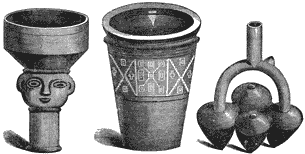
By John D. Baldwin.
The only Spanish writer who really studied the ancient history of Peru in the traditional and other records of the country was Fernando Montesinos, who went there about a century after the Conquest. He was sent from Spain on service which took him to every part of Peru, and gave him the best possible opportunities for investigation. He was a scholar and a worker, with a strong inclination to such studies, and, during two periods of residence in the country, he devoted fifteen years to these inquiries with unremitting industry and great success. He soon learned to communicate freely with the Peruvians in their own language; then he applied himself to collect the historical poems, narratives, and traditions. He succeeded in getting assistance from many of the older men who had learned of the amautas, and especially of those who were trained to read the quippus. Nothing was omitted which could aid his purpose. In this way Montesinos made a great collection of what may be called the old Peruvian documents, and gained a vast amount of information which no other writer had used or even sought to acquire.
The materials collected were more important than is at once understood by those accustomed to depend wholly on writing and printing for the preservation of literature, because they can not easily realize to what extent the faculty of memory may be sharpened and developed by a class of men devoted to this culture in communities where such mechanical aids do not exist. It is known that long poems, stories, and historical narratives have been preserved by unlettered peoples much below the civilized condition of the Peruvians. Long poems, extending to three and four hundred lines, were retained by memory, and transmitted from generation to generation among the Sandwich Islanders. Many scholars have believed that all the early literature of Greece, including the Iliad, the Odyssey, and all other “poems of the Cycle,” was preserved in this way by the Rhapsodists for centuries, down to the time of Peisistratus, and then for the first time reduced to writing. This shows at least what they have believed was possible. In Max Müller’s “History of Ancient Sanskrit Literature” it is argued strongly that the Vedas were not written at first, but were transmitted orally, being learned by heart in the great religious schools of the Indo-Aryans as an indispensable part of education. This is likely to be true, whether we assume that the Indo-Aryans had or had not the art of writing; for, in the Vaidic age, the divine songs of the Veda were so intimately associated with the mysteries of their religion that they may have been held too sacred to be made common by written characters.
Therefore it is no wise incredible, nor even surprising, that a considerable amount of literature existed in Peru without the aid of writing. On the contrary, it would be surprising if they had failed to do what has been done by every other people in like circumstances. The schools of the amautas were national institutions specially set apart for the business of preserving and increasing knowledge, teaching, and literary work of every kind. In a country where civilization was so much advanced in many respects, they could not have been entirely barren. Those who criticize Montesinos admit that “his advantages were great,” that “no one equaled him in archeological knowledge of Peru,” and that “he became acquainted with original instruments which he occasionally transferred to his own pages, and which it would now be difficult to meet elsewhere.” The results of his investigation are embodied in a work entitled “Memorias Antiguas Historiales del Peru.” This, with another work on the Conquest entitled “Annales,” remained in manuscript at Madrid until the “Memorias” was translated into French by M. Ternaux-Compans, and printed in his collection of original documents relating to the discovery and exploration of America.
*******
This is taken from Ancient America, originally published in 1871.
Copyright © D. J. McAdam· All Rights Reserved